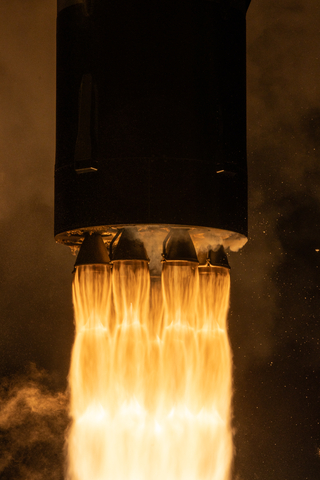Rocket Lab Successfully Launches First of Two Climate Science Satellites for NASA
Rocket Lab successfully launched the first of two climate science satellites for NASA's PREFIRE mission from Launch Complex 1 in Mahia, New Zealand on May 25, 2024. The mission aims to detect heat loss over the Arctic and Antarctica by deploying two satellites into a 525km Low Earth Orbit. The second satellite will be launched in a few days. This mission will provide critical data to improve climate and ice models, aiding in better predictions of sea level and weather changes. Rocket Lab's Electron rocket was chosen for its ability to launch dedicated missions to precise orbits on demand.
- Successful deployment of the first satellite for NASA's PREFIRE mission.
- Critical data expected to improve climate and ice models.
- Rocket Lab's Electron rocket showcased its capability for precise, dedicated launches.
- Mission supports climate change research and better prediction of sea level and weather changes.
- Sixth Electron launch of 2024, demonstrating consistent operational success.
- Rocket Lab has a strong track record with 48 successful Electron launches.
- The second satellite's successful launch is still pending, posing a potential risk.
- No new financial data or revenue impact was provided in the PR.
Insights
Rocket Lab's recent successful launch of the first satellite for NASA's PREFIRE mission holds significant financial implications for the company. Launching NASA missions further solidifies Rocket Lab’s reputation and can lead to more lucrative government contracts in the future. This is the sixth launch for Rocket Lab this year, demonstrating consistency in their operational capacity. Consistent performance and successful missions are critical for securing future contracts, driving revenue and enhancing investor confidence. Furthermore, Rocket Lab's ability to provide dedicated missions and precise orbital placements showcases their technological capabilities, which can be attractive to both governmental and private clients.
However, investors should be mindful of the potential for increased operational costs associated with maintaining high launch frequencies and ensuring mission success. While the immediate success of the PREFIRE mission is promising, the financial sustainability will depend on the company’s ability to maintain this performance level without incurring significant additional costs.
The successful deployment of the satellite for NASA’s PREFIRE mission underscores Rocket Lab's position in the highly competitive space launch sector. The market for small satellite launches is rapidly growing and Rocket Lab’s demonstrated reliability and precision place it favorably against competitors. By catering specifically to niche scientific missions such as PREFIRE, Rocket Lab can carve out a specialized market segment, which may offer better margins and foster strong client relationships.
In the broader market context, the increasing governmental focus on climate change and space exploration presents significant growth opportunities. Rocket Lab’s track record of successful missions can potentially attract new customers from both the public and private sectors, enhancing their market share and long-term growth prospects. It is crucial, however, for the company to continue innovating and meeting client expectations, as the space launch market remains highly dynamic and competitive.
Rocket Lab's success with the PREFIRE mission highlights their technological prowess in the space industry. The Electron rocket’s capability to launch small satellites into specific orbits with high precision is a testament to Rocket Lab’s advanced engineering and reliability. Such technical capabilities are important for scientific missions like PREFIRE, which require accurate data collection through specific orbital paths. The use of thermopile sensors to measure heat loss at far-infrared wavelengths is particularly innovative, offering new insights into climate change effects.
From a technological standpoint, Rocket Lab’s ability to perform back-to-back launches with tight schedules is a significant achievement, showcasing operational efficiency and robustness. This capability could set a new standard in the industry and position Rocket Lab as a go-to provider for time-sensitive and specialized missions.
Investors should note that continued investment in technology and infrastructure will be necessary to maintain and advance these capabilities, which could impact short-term financials but is essential for long-term success.
The satellite was the first of two that will launch on Electron for NASA’s PREFIRE mission to detect heat loss over the Arctic and
MAHIA,

Rocket Lab's Electron rocket lifts off from Mahia,
‘Ready, Aim, PREFIRE’ lifted-off from Rocket Lab Launch Complex 1 in Mahia,
Rocket Lab’s ability to launch dedicated missions to precise orbits on demand is critical to the success of PREFIRE. The mission requires two separate satellites to follow similar trajectories but along different paths to overlap with each other every few hours near the Arctic and
Rocket Lab founder and CEO, Peter Beck, says: “Missions like PREFIRE demonstrate the unique benefit of Electron – dedicated launch for small satellites to precise orbits on precise schedules. We’ve demonstrated this back-to-back launch capability for NASA once before with the TROPICS mission and we’re excited to deliver it once again for PREFIRE. Climate change-focused missions like this are essential to understanding and safeguarding the future of our planet. It’s a privilege to support them on Electron.”
Today’s successful mission was Rocket Lab’s 48th Electron launch overall and sixth launch of 2024.
Images and video from launch: https://flic.kr/s/aHBqjBp4Cy
+ About Rocket Lab
Founded in 2006, Rocket Lab is an end-to-end space company with an established track record of mission success. We deliver reliable launch services, satellite manufacture, spacecraft components, and on-orbit management solutions that make it faster, easier, and more affordable to access space. Headquartered in
+ Forward Looking Statements
This press release contains forward-looking statements within the meaning of the Private Securities Litigation Reform Act of 1995. We intend such forward-looking statements to be covered by the safe harbor provisions for forward looking statements contained in Section 27A of the Securities Act of 1933, as amended (the “Securities Act”) and Section 21E of the Securities Exchange Act of 1934, as amended (the “Exchange Act”). All statements contained in this press release other than statements of historical fact, including, without limitation, statements regarding our launch and space systems operations, launch schedule and window, safe and repeatable access to space, Neutron development, operational expansion and business strategy are forward-looking statements. The words “believe,” “may,” “will,” “estimate,” “potential,” “continue,” “anticipate,” “intend,” “expect,” “strategy,” “future,” “could,” “would,” “project,” “plan,” “target,” and similar expressions are intended to identify forward-looking statements, though not all forward-looking statements use these words or expressions. These statements are neither promises nor guarantees, but involve known and unknown risks, uncertainties and other important factors that may cause our actual results, performance or achievements to be materially different from any future results, performance or achievements expressed or implied by the forward-looking statements, including but not limited to the factors, risks and uncertainties included in our Annual Report on Form 10-K for the fiscal year ended December 31, 2023, as such factors may be updated from time to time in our other filings with the Securities and Exchange Commission (the “SEC”), accessible on the SEC’s website at www.sec.gov and the Investor Relations section of our website at www.rocketlabusa.com, which could cause our actual results to differ materially from those indicated by the forward-looking statements made in this press release. Any such forward-looking statements represent management’s estimates as of the date of this press release. While we may elect to update such forward-looking statements at some point in the future, we disclaim any obligation to do so, even if subsequent events cause our views to change.
View source version on businesswire.com: https://www.businesswire.com/news/home/20240525030788/en/
+ Rocket Lab Media Contact
Morgan Connaughton
media@rocketlabusa.com
Source: Rocket Lab USA, Inc.
FAQ
What is the purpose of Rocket Lab's PREFIRE mission for NASA?
When did Rocket Lab launch the first PREFIRE satellite?
What is Rocket Lab's Electron rocket known for?
How many launches has Rocket Lab conducted in 2024?







